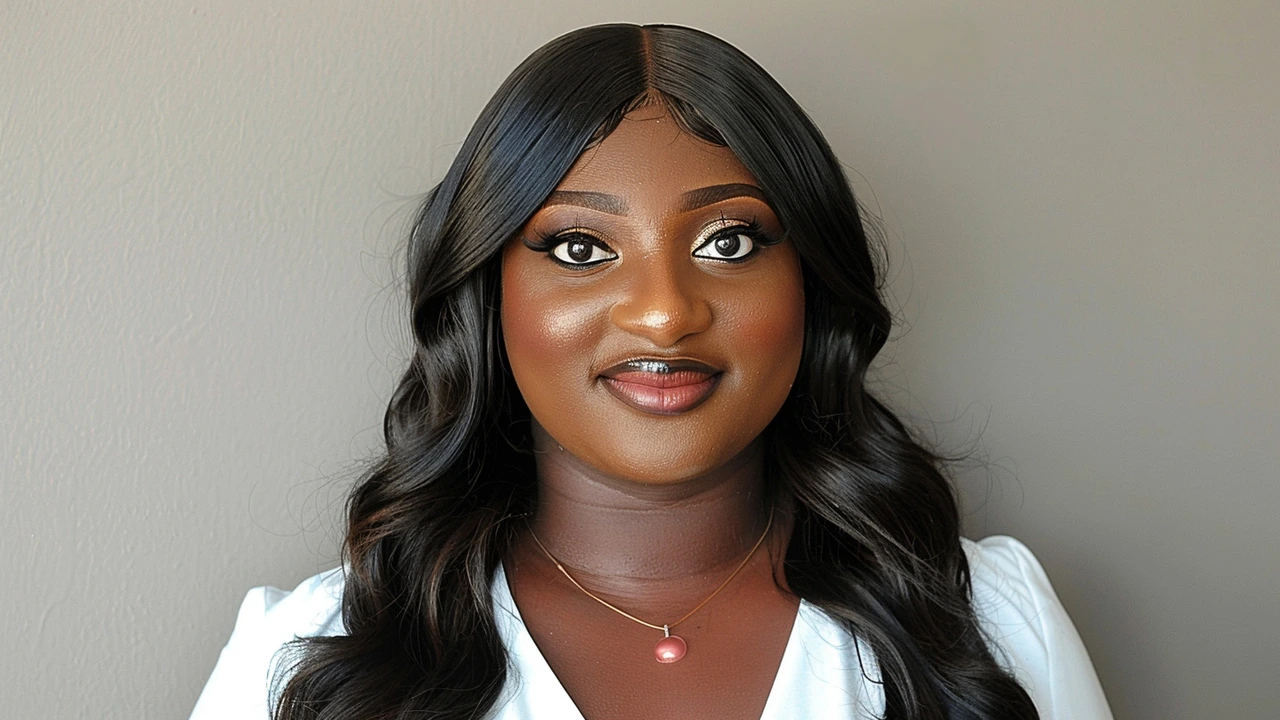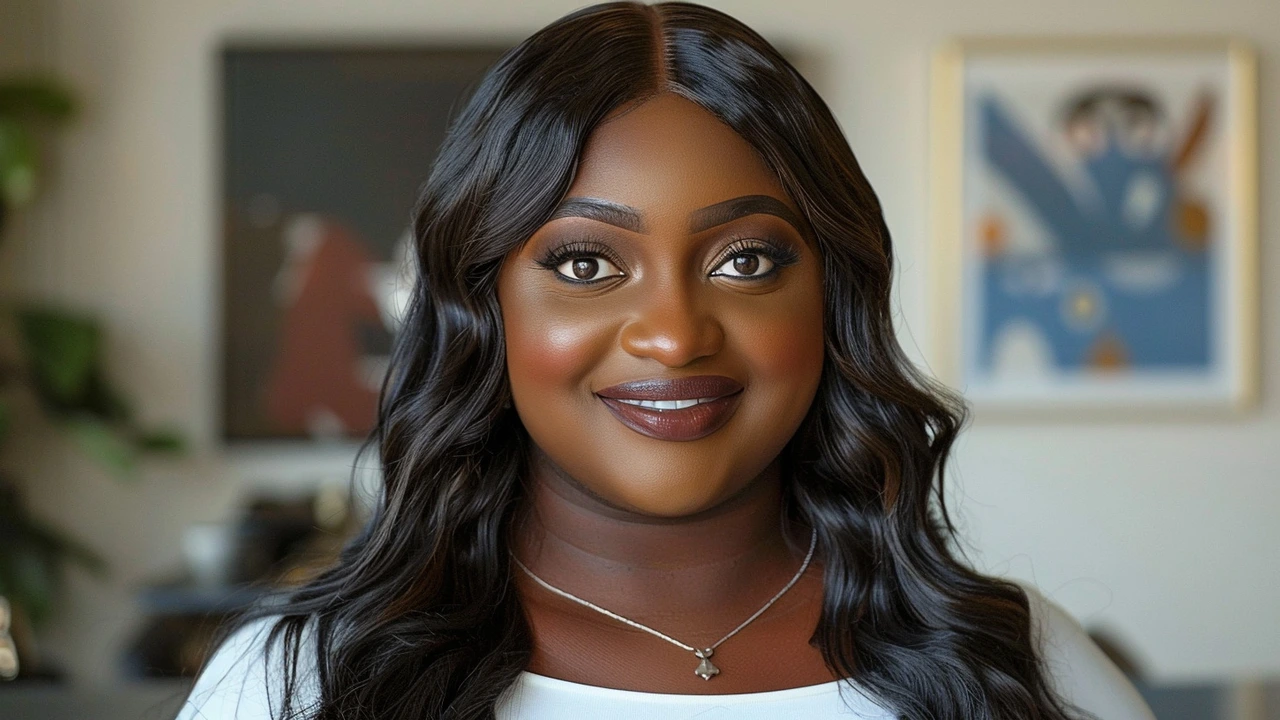Yvonne Jegede’s Revelations About Her Marriage
Prominent Nollywood actress Yvonne Jegede has shared some candid insights into the difficulties she faced in her marriage. Jegede revealed that her ex-husband, who was eight years her senior, began to grow sensitive to her jokes shortly after they tied the knot. This transformation in his behavior was unexpected for her, leading to growing tension within their relationship.
However, this was not the sole reason for the breakdown of their marriage. Jegede expressed that one of the significant factors contributing to their separation was the financial dynamic between them. She noted that she consistently earned more money than her ex-husband and had to shoulder the responsibility of taking care of their son on her own. This financial imbalance, combined with her ex-husband's growing sensitivity, created an untenable situation for her.
Jegede has openly stated her regrets about prioritizing love over financial stability in her marriage. She emphasized that while love is essential, financial independence and stability are equally crucial in a successful partnership. Her experiences have led her to advise others to consider all aspects of a relationship carefully before making long-term commitments.
Influencer @jon-d-doe's Take on the Situation
In response to Jegede's revelations, a well-known influencer on X, @jon-d-doe, shared his perspective on the matter. He tweeted that women often seek partners who are more successful than themselves, particularly when they feel superior to their husbands in terms of financial status. According to him, this dynamic can lead to dissatisfaction and tension within the relationship.
@jon-d-doe advised men to strive to stay ahead of their wives financially. He argued that maintaining a higher level of success and income could help prevent the kind of issues that Jegede experienced in her marriage. His comments have sparked a wide range of reactions on social media, with various users sharing their thoughts and opinions on the matter.

Financial Power Dynamics in Relationships
The conversation sparked by Jegede’s revelations and @jon-d-doe’s comments highlights the broader issue of financial power dynamics in relationships. Many couples face similar challenges when there is a significant disparity in income between partners. This can lead to feelings of inadequacy, resentment, and tension, which can ultimately contribute to the breakdown of the relationship.
In many societies, traditional gender roles often place the expectation on men to be the primary breadwinners. However, as more women achieve financial independence and success in their careers, these traditional roles are evolving. This shift can create new challenges for couples as they navigate their changing dynamics and find a balance that works for both partners.
The Importance of Communication and Understanding
One of the key takeaways from Jegede’s experience and the ensuing discussion is the importance of communication and understanding between partners. Open and honest conversations about finances, expectations, and individual contributions can help couples navigate these challenges more effectively. It is essential for both partners to feel valued and supported, regardless of their financial status.
Couples may also benefit from seeking professional guidance, such as couples therapy or financial counseling, to address these issues and find constructive solutions. By working together and maintaining a strong foundation of mutual respect and understanding, couples can overcome the challenges posed by financial disparities.

Yvonne Jegede’s Message to Her Fans
In her reflections on her marriage, Yvonne Jegede has emphasized the importance of making informed and well-rounded decisions in relationships. She urged her fans to consider all aspects of a partnership, including emotional, financial, and practical compatibility, before making long-term commitments.
Jegede’s candid sharing of her experiences serves as a reminder that love alone is not always enough to sustain a relationship. Financial stability and mutual support play crucial roles in building a successful and lasting partnership. Her message is a call to action for individuals to prioritize their well-being and future stability when entering into relationships.
Final Thoughts
The story of Yvonne Jegede’s marriage and the subsequent reactions highlights some of the complex issues that modern couples face. Financial power dynamics, communication, and mutual respect are all crucial elements in a successful relationship. As societal norms continue to evolve, it is essential for couples to adapt and find new ways to navigate these challenges together.
For many, Jegede's story serves as a valuable lesson in the importance of balancing love with practical considerations. While love remains a vital foundation, the financial and emotional well-being of both partners is equally important for a harmonious and enduring relationship.


Comments (18)
Wow, love hurts more than a paycheck.
It’s truly inspiring to see Yvonne speak openly about the challenges that many couples face; communication is the cornerstone of any partnership, and when financial topics become taboo, resentment can quietly grow. Remember, a healthy dialogue about money isn’t a sign of distrust but a foundation for mutual respect. Keep encouraging those brave enough to share their stories, because they help us all learn.
While the narrative is compelling, we must not overlook the fact that constantly highlighting financial imbalances can create a victim mentality. It’s essential for individuals to evaluate their own contributions beyond mere monetary value and consider emotional labor. Ultimately, personal accountability matters more than external judgments.
Couples should sit down, list all expenses, and decide together who pays what. Simple budgeting apps can make the process transparent and reduce misunderstandings.
Money should never trump love; if you let finances dictate affection, you’ve already lost the battle.
In the dialectic of relational economics, one must interrogate the ontology of earning versus caring; the surplus of capital does not inherently equate to relational surplus, but it certainly reshapes power dynamics.
Ah, the age‑old tale of the well‑paid wife and the insecure husband-how delightfully predictable.
Everyone has a point, but maybe we should just let people live their lives without judging every paycheck.
One might postulate that the societal expectation for men to be primary earners is antiquated, yet the underlying anxiety remains palpable when traditional hierarchies are subverted.
Yvonne’s experience is a vivid reminder that love alone isn’t a financial safety net; couples need to sit down, map out their goals, and make sure both partners feel heard. In many Indian households, the cultural script still paints men as providers, which can cause friction when women rise professionally. It’s crucial to challenge those scripts by having candid conversations about money early on. A joint budgeting session can demystify income gaps and reveal where each partner can contribute beyond cash, like household management or emotional support. Some couples find success by setting a percentage‑based contribution model, where each partner puts in a proportion of their earnings, ensuring fairness regardless of salary differences. Others prefer a shared‑expenses account for rent and utilities while keeping personal spending separate. Professional counseling can help navigate these negotiations if emotions run high. The key is to treat finances as a partnership endeavor, not a battlefield. Mutual respect thrives when both parties feel their contributions-financial or otherwise-are valued. And remember, seeking help isn’t a sign of weakness; it’s a proactive step toward a healthier relationship. By normalizing these talks, we can reduce the stigma around women earning more and men feeling insecure. Ultimately, love, respect, and communication are the trinity that safeguards a marriage from financial strain.
Sure, because every relationship needs a PowerPoint on who owes what.
Honestly, the whole “men must stay ahead financially” meme is just another outdated trope; if you’re still buying into that, maybe reconsider your sources of advice-there’s plenty of data showing egalitarian finances correlate with happier marriages.
Drama alert! When the wife earns more, the husband’s ego takes a nosedive, and suddenly everyone’s playing the victim. Spoiler: the real drama is the silence that builds when money talks, but love refuses to listen.
Look, it’s great to talk about finances, but don’t forget you can still laugh about it-maybe set a “date night budget” and stick to it, then you’ll both feel like winners.
Keep your head up! Money stuff can be tough, but communication can turn any challenge into a stepping stone.
For anyone feeling overwhelmed, start with a simple spreadsheet: list income, list expenses, and see where you can share responsibilities. It’s not about who makes more; it’s about building a partnership where both feel secure and valued. If you need extra guidance, consider a financial counselor-think of it as relationship therapy for your wallet.
From a socio‑political perspective, the discourse surrounding Yvonne Jegede’s marriage underscores a persistent patriarchal framework; the insistence that men “stay ahead” financially is a veneer for maintaining hegemonic dominance. Analyzing the rhetoric of @jon‑d‑doe reveals an agenda that seeks to re‑legitimize traditional gender hierarchies under the guise of advice. While some may view his statements as motivational, they ultimately reinforce a binary that marginalizes women’s economic autonomy. In contemporary Indian society, where women’s participation in the formal labor market is rising, such narratives become increasingly discordant with lived realities. Constructive dialogue should instead champion equity, encouraging couples to negotiate financial responsibilities based on mutual consent rather than outdated expectations. Policies that support shared parental leave and affordable childcare further alleviate pressure on both partners, fostering a more balanced distribution of domestic and economic duties. Ultimately, the path forward lies in dismantling the myth that financial superiority equates to masculinity, and embracing a model where partnership thrives on collaboration, not competition.
Interesting take, thanks for sharing.